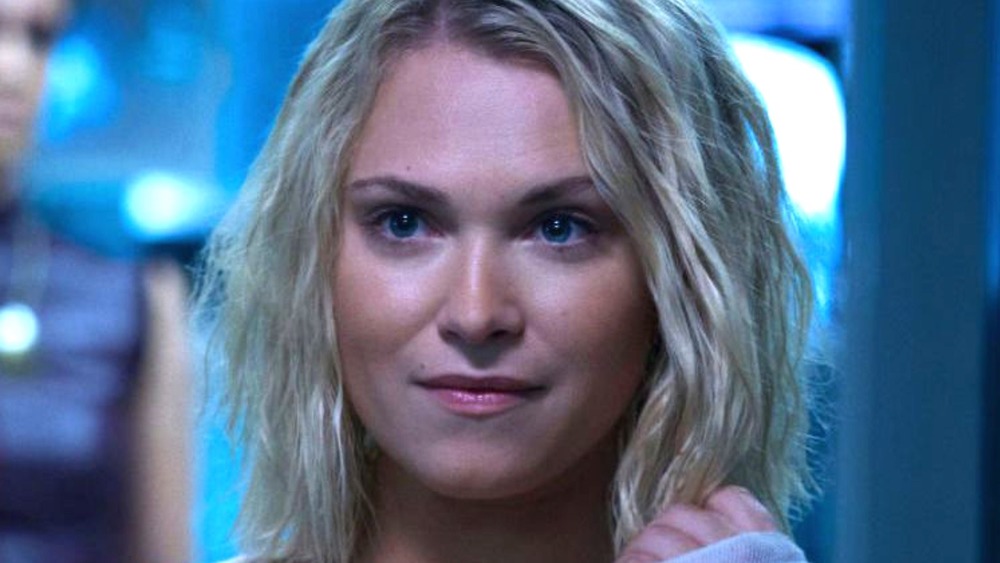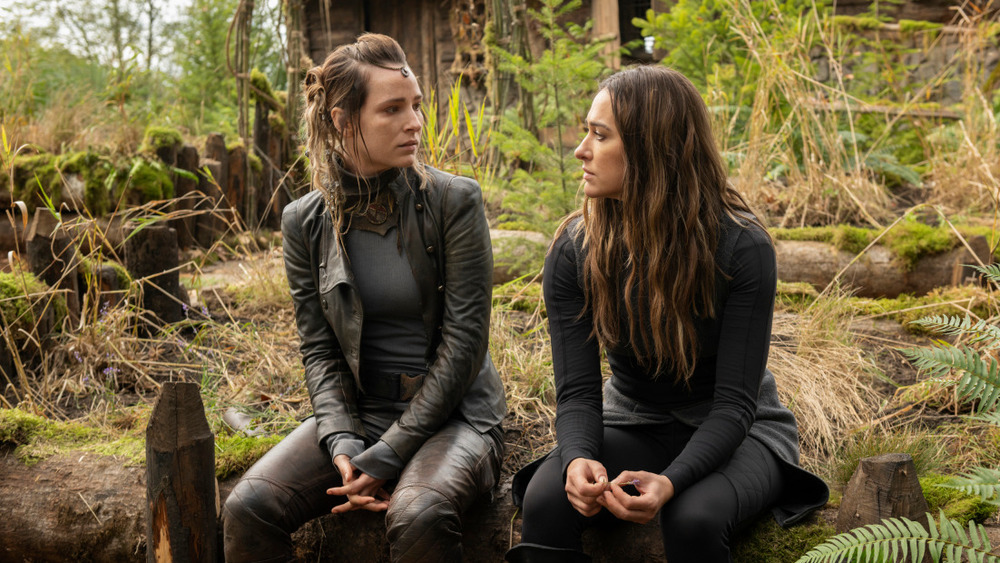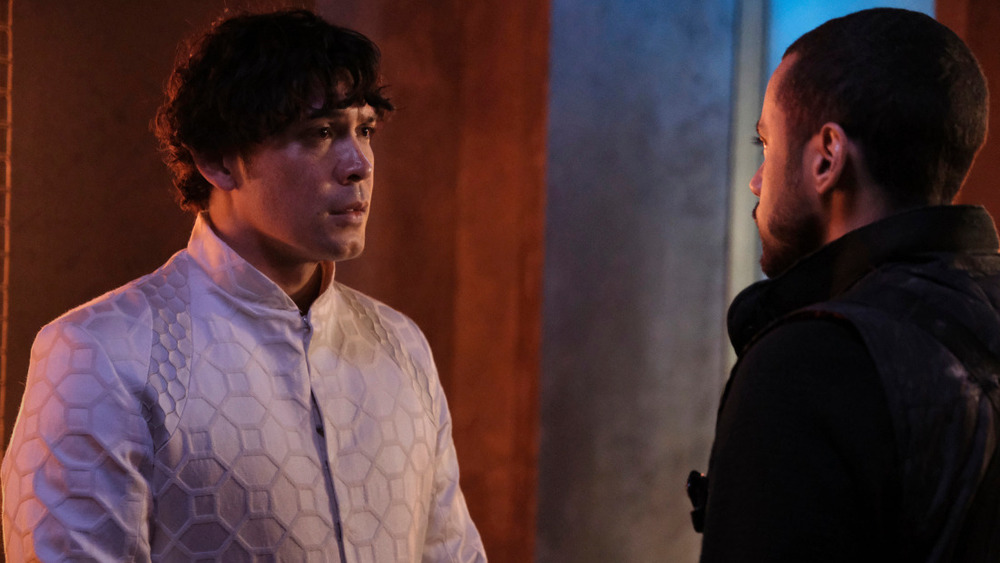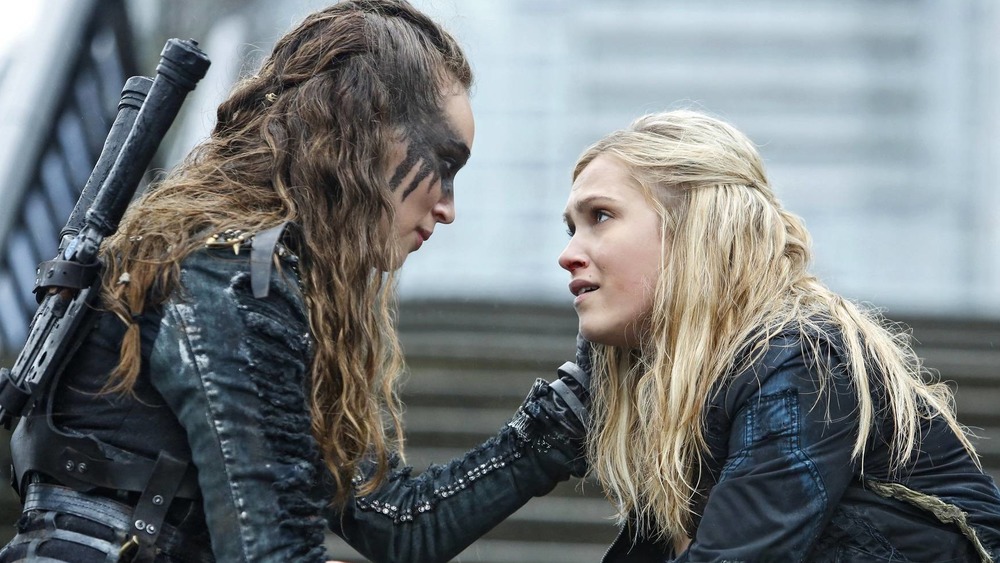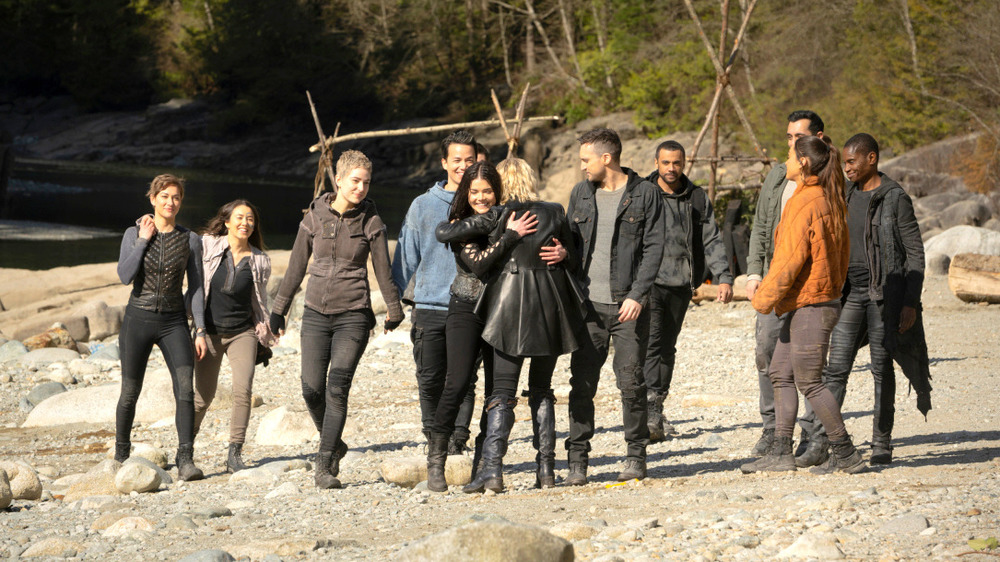The Ending Of The 100 Explained
The CW's science-fiction television series The 100 started in 2014 and aired its seventh and final season in 2020. At the show's start, the setting is 2149, and 100 delinquent teenagers are sent down to Earth to test if it's livable again, after an apocalyptic event seemingly destroys it with radiation. This crew of "the 100" includes the young, resilient leader Clarke Griffin (Eliza Taylor), troublemaker Murphy (Richard Harmon), best friends Monty and Jasper (Christopher Larkin and Devon Bostick), and siblings Octavia and Bellamy Blake (Marie Avgeropoulos and Bob Morley). Genius engineer Raven Reyes (Lindsey Morgan) joins them on the ground soon after.
Throughout seven seasons, the 100 survivors face many extreme challenges, including war with the native clans, a tyrannical AI, and oh yes, another apocalypse. At the beginning of season 7, the much smaller crew is on another planet having just survived a cult takeover attempt, when they come face to face with something called the Anomaly. This is a wormhole that essentially acts as a portal to a different system of planets, controlled by a group called the Disciples. The season 7 story is quite jumbled and hard to understand, but at its simplest, Bellamy, Octavia, Charmaine Diyoza (Ivana Milicevic), and Diyoza's daughter Hope (Shelby Flannery) become heavily involved with the Disciples and the Anomaly. Clarke and the others back at Sanctum have their own trouble to deal with as Sheidheda, the Dark Commander, vies for control. But soon enough, the two stories become fully intertwined, as the end of The 100 draws near.
So how does Clarke and The 100's story end?
The 100 crew's journey through the Anomaly to transcendence
To untangle a long and winding story, the Disciples are a cult of fellow survivors of Earth who worship a man called the Shepherd, also known as Bill Cadogan (John Pyper-Ferguson), and foresee a "last war." Through Octavia and the others stuck in the Anomaly, the group learns that the Disciples have it wrong, and the "last war" is actually a "last test," a final judgement that will supposedly grant the human race "transcendence" — if they pass, that is. Cadogan is eventually able to access the final test for transcendence and the privilege of joining "with the consciousness of an alien race, who are considered a higher form of beings," as Den of Geek explains it. Cadogan goes in, but before he can do anything, Clarke appears and kills him, beginning her own judgement.
With Clarke's dark past as Wanheda, aka the Commander of Death, it should be no surprise to learn that she fails. Raven enters to get a second chance, and the judge transports them to where Wonkru and the Disciples are currently on the precipice of a full-on battle to determine the final decision. At first it seems like another failure, but soon Octavia is able to convince everyone that they need to unify, not fight each other. The judge allows the human race to transcend, save Clarke. In the final scene of the series, Clarke appears on Earth to live out the rest of her days on her own. As she approaches a nearby beach, she comes across a surprising sight. It turns out many of her friends decide not to transcend, staying on Earth with Clarke in their own little paradise.
The 100 characters we lost along the way
There are a couple important characters who unfortunately don't make it to the series finale. The first is Diyoza, who dies in episode 10, "A Little Sacrifice." Shortly after being reunited with her daughter, Diyoza sacrifices herself to stop Hope from becoming a vengeful murderer like her. It's a sad but understandable sacrifice.
Then there's Bellamy. This death has gotten a lot of backlash from fans, and with good reason. In season 7, episode 13, "Blood Giant," Bellamy is shot by Clarke in an attempt to protect Madi from the Disciples. As Emily Hannemann at TV Insider put it, "Bellamy's death rings of shock value rather than narrative weight. He didn't even have meaningful last words, like Lexa, Lincoln, or Jasper, and he died a villain to those he loved and sacrificed for, again and again, throughout the show. That stings." Bellamy and Clarke's relationship, romantic or not, is one of the main pillars of The 100, and both of their actions at this moment feel very out-of-character. Even in the midst of such strong emotion, Clarke would normally be smart and calculating enough to know that his death is not necessary, and considering she doesn't even get the notebook that holds the information about Madi, it's all for naught.
One thing that should be noted is Morley asked to have a smaller role in the last season because he was dealing with mental illness. But knowing his wife, Taylor, the actress who plays Clarke, has said "I don't necessarily agree with Bellamy's death," there might be more to the story (via LA Times).
The history of disappointing deaths in The 100
This disappointing death is honestly not too surprising given the history of the show. In season 3 of The 100, fan-favorite character Lexa (Alycia Debnam-Carey), one half of the beloved "Clexa" — Clarke and Lexa — relationship, is killed by a stray bullet. The showrunner, Jason Rothenberg, was accused of perpetuating the "Bury Your Gays" trope, in which "a disproportionate number of LGBT characters [are] killed off, often in the name of propping up and/or advancing a heterosexual leading character's storyline." The Hollywood Reporter wrote about this trend in the aftermath of Lexa's death, stating that at the time of publication, March 21, 2016, "In the past 30 days, four lesbian or bisexual female characters have been killed off on their respective TV shows" that include Jane the Virgin, The Walking Dead, The Magicians, and of course, The 100.
This started a worldwide movement of #LexaDeservedBetter, which spawned a fundraiser for The Trevor Project that raised over $155,000. Rothenberg wrote a letter to fans apologizing, but it definitely tainted the show. Debnam-Carey has appeared in a few episodes since her character's death, and she returns one last time in the series finale. Unfortunately, it's Clarke's interpretation of the transcendence judge, not the real Lexa. Soon after, another fan-favorite character appears when Raven tries for transcendence, as the alien judge takes the form of Abby (Paige Turco), Clarke's mom and Raven's mother figure. The two have a very close relationship throughout the series until Abby's death in season 6.
Is it a fitting ending for The 100?
This is ultimately up to the fans. The 100 series finale has led to a lot of debate, and the response is largely mixed. Some fans found the ending to be satisfying, like user brycenh30, who shared on Reddit that "this blew me away, one of the best series finales I've watched." On the other hand, some people like u/Elairah_ said, "This whole transcendence thing just feels like a cop out for story telling [...] I thought this show was about free will, sacrifice, humanity and survival... but I felt like it was taken away in the name of religion and 'a higher power.'" Don't take the fans' word for it, and interpret The 100 series finale however you want.
Despite whatever you may think about the ending, The 100 should still be remembered as a landmark series, as it showcases a diverse cast of characters with a bisexual female lead. Adina Porter, who plays the warrior Indra, said, "I cannot tell you how many times women want to give me a hug," and explained "how many Black women come up to me and thank me for wearing my hair natural on television. I think people appreciate that maybe they also can have a swagger and be a badass after being 35 years old. It makes me feel like I'm giving them a reflection that it's possible" (via LA Times).
Thankfully, the story of The 100 might not be over just yet, as there is a prequel series in development at The CW that's status is still up in the air. The 100 aired the backdoor pilot for the prequel series as season 7, episode 8, "Anaconda."
